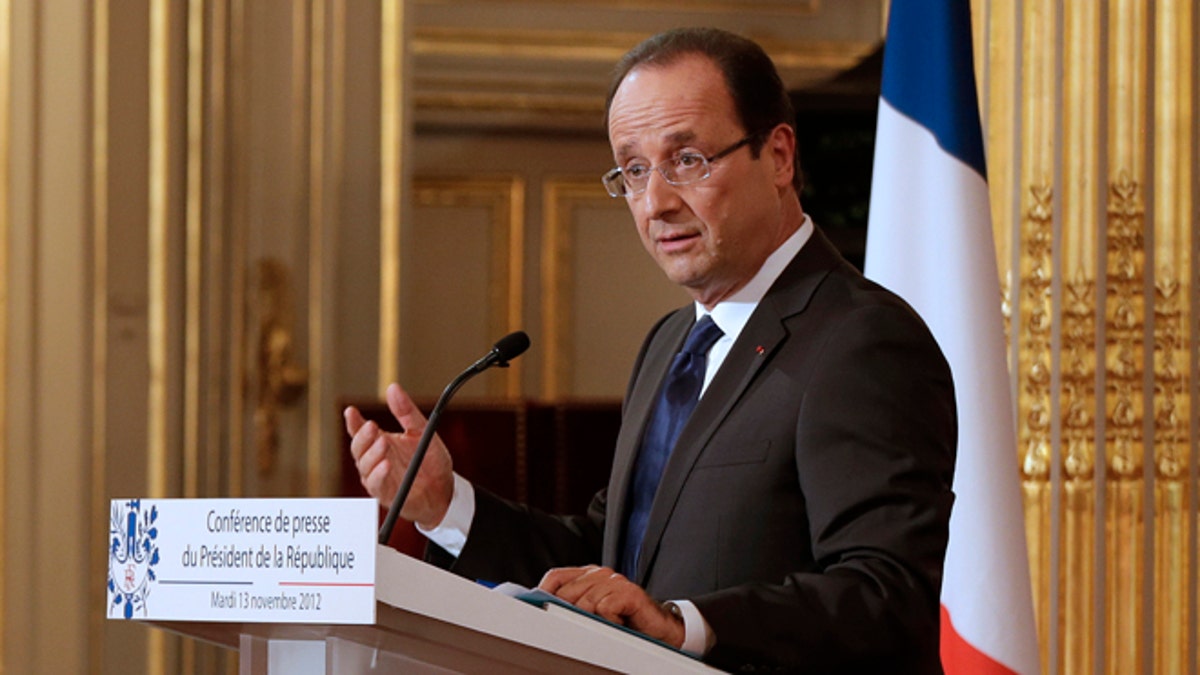
French President Francois Hollande believes homework is unfair to poor kids. (AP/POOL Reuters)
You know a European country is in trouble when its business leaders complain about government spending and taxes. You know it’s seriously in trouble when it happens in France, whose business elites are more left-wing than the left.
Nearly 100 French CEOs, among them the heads of Accor, the hotel chain, Air France, Carrefour, L´Oréal, Peugot, Siemens, SociétéGénerale and Veolia, the giant waste and water utility, are urging socialist President Francois Hollande to reduce government spending by 60 billion euros (about $76 billion) over the next five years, and reduce payroll taxes by 30 billion euros over the next two years. The cost of government, they say, has reached “the limits of what is bearable.”
They also are asking Hollande to undo the suffocating regulations that have made research and development too costly, that unrealistically limit carbon emissions, and have curtailed development of shale gas in France.
They are right, of course.
Government spending now amounts to 56 percent of GDP in France, more than double what it is in the United States. To pay for this profligacy, the government's 2013 budget proposes taxing top earners at a 75 percent rate and those earning more than 150,000 euros, or about $191,000 per year, at 45 percent. Other taxes also are going up (on dividend income and certain capital gains, for instance). All of which has pushed France’s wealth and jobs creators – its business leaders – to the point of desperation.
Some are even voting with their feet. Bernard Arnault, head of the luxury brand LVHM (Louis Vuitton-Moet Hennessy) and the country’s richest man, is seeking a Belgian passport. In response to critics, he claims he’ll continue to pay taxes in France, but it’s obvious that he’ll eventually move across the border.
What we are seeing in France, as elsewhere in Europe, is the collapse of the welfare state.
President Hollande thinks the solution to his country’s severe deficits, huge debt, loss of competitiveness and economic stagnation, is more tax revenue, more financial stimulus, and more government generally …. you know the drill. But France’s fiscal problems, like our own, are a symptom of too much, not too little, government.
The complaining business executives have no one to blame but themselves. For decades, the business elite supported the welfare state unflinchingly. Record levels of government spending were possible because the government gave incentives to banks so they would buy the government bonds that sustained the spending. Spending would not have doubled in France in the last two decades were it not for the complicity of the elites.
Those elites have finally panicked – and rightly so. They realize this cannot go on. They can see that their businesses are becoming less competitive by the day (with a few notable exceptions) and that the government has created an environment in which every effort to modernize and innovate meets entrenched resistance.
France has been spared the havoc we are seeing in Greece and Spain only because those countries are doing worse.
But the correct way to measure France is to compare it to Germany, not to Greece or Spain. In 2000, France’s exports amounted to 55 percent of Germany’s exports. Today the figure is 40 percent.
The reason for this is not difficult to ascertain: The cost of government-mandated benefits –a major complaint of the CEOs – amounts to more than 50 euros for every 100 euros paid in salaries, almost twice as much as in Germany.
France’s decline mirrors that of Europe as a whole. Every decade since the 1970s the economic performance of the 27 countries that make up the European Union has deteriorated. In the 1970s, economic growth averaged 3.1 percent. In the 1980s the figure was 2.5 percent. In the 1990s it was 2.1 percent and in the last decade, 1.4 percent.
Obviously these averages don’t tell the whole story—some countries have done better than others. But the bulk of Europe has let the parasitical welfare state devour its social and economic energy. The results are what we see.
If change is going to come, it will come because some of the enablers in the business community have begun to realize that the system leads inexorably to collapse. There is no longer enough to go around for all the parties involved.
The business elites are now reacting. The big questions are: Is it too late? And will U.S. business elites wake up as well?
